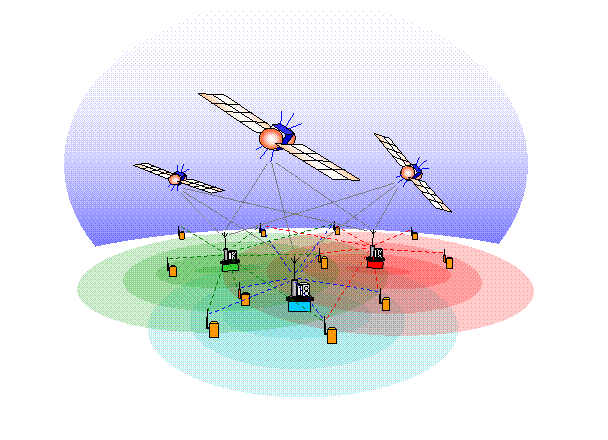| Sponsor: | N/A |
| Period: | Feb. 2002 - |
| Students: | Rong Peng |
| Vaidyanathan Ramadurai (graduated Summer 2003) |

The goal of this project is to determine the location of sensor nodes in (large) wireless sensor networks without the use of one GPS receiver on every wireless node. Furthermore, we assume that the inexpensive (and power conscientious) have no special hardware dedicated to the localization task (i.e., no special acoustic ranging microphones/speakers, no directional antennas, etc.).
The main information source we consider is available in virtually all wireless transceivers: the received signal strengh indicator (RSSI). The main problems with using the RSSI as a indication of the distance between two nodes is it's variability: signal strengh is subject to wireless propagation problems (e.g., absobtion, fading, etc.), and RSSI readings are notoriously inaccurate.
We use an iterative, Bayesian approach shown to significantly outperforms existing localization techniques.
Probabilistic Localization for Wireless Sensor Networks, to appear in ACM Mobile Computing and Communications Review, 2006.
Localization of Wireless Sensor Networks with a Mobile Beaconin Proceedings of the First IEEE Conference on Mobile Ad-hoc and Sensor Systems (MASS 2004), (Fort Lauderdale, FL), October 2004.
Simulation-based Analysis of a Localization Algorithm for Wireless Ad-Hoc Sensor Networks,in Proc. of OPNETWORK 2003, (Washington, DC), Oct. 2003.
Localization in wireless sensor networks: A probabilistic approach,in Proc. of the 2003 International Conference on Wireless Networks (ICWN 2003), Las Vegas, NV, June 2003, pp. 275-281.
Simple algorithm for outdoor localization of wireless sensor networks with inaccurate range measurements,in Proc. of the 2003 International Conference on Wireless Networks (ICWN 2003), Las Vegas, NV, June 2003, pp. 300-305
Localization in Wireless Sensor Networks with Inaccurate Range Measurements,MS Thesis, Dept. of Electrical and Computer Eng., NC State University, Raleigh, NC 27695, Aug. 2003.